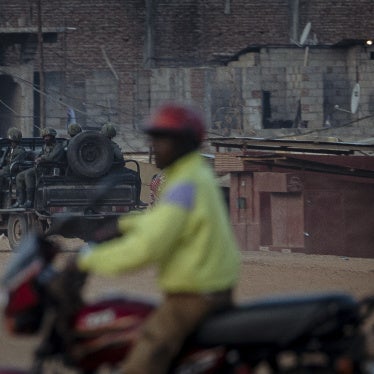(New York) – The Organization of Islamic Cooperation (OIC) should immediately take action against Syria for violating the organization’s charter by systematically and brutally suppressing peaceful civilian protests, Human Rights Watch said today in a letter to the group’s secretary-general.
The OIC should send a delegation to Syria to investigate the serious crimes and human rights violations and to express to Syrian authorities in the strongest terms the organization's condemnation of these repressive measures, Human Rights Watch said. The OIC should issue a clear statement that security forces conducting policing may use lethal force only when strictly necessary to protect life, and that killing peaceful protesters is a serious violation of the OIC charter, Human Rights Watch said.
“Syria, a member of the OIC since 1970, has for four months now made a mockery of its international obligations with unlawful killings, disappearances, torture, and sieges on whole cities, towns, and villages,” said Sarah Leah Whitson, Middle East director at Human Rights Watch. “The OIC should immediately take action against this member state.”
The OIC, based in Jeddah, Saudi Arabia and less than an hour’s drive from Mecca, the birthplace of Islam, represents states with over 1.5 billion Muslims. With 57 member states, it is the second-largest inter-governmental organization in the world, after the United Nations.
Under article 2 of the OIC's charter, “Member states shall uphold and promote, at the national and international levels, good governance, democracy, human rights and fundamental freedoms, and the rule of law.”
While Arabs and Muslims celebrate the holy month of Ramadan, which began on August 1, hundreds of thousands of people in Syria are bearing the brunt of a ferocious campaign that has left around 2,000 people dead and tens of thousands wounded or detained.
Human Rights Watch said that the OIC is shirking its responsibility under its own charter as hundreds of Syrians are killed, detained, tortured, or wounded on a daily basis, in what are almost certainly crimes against humanity.
The OIC's secretary-general, Ekmeleddin İhsanoğlu, expressed “concern” at civilian casualties on August 2, 2011. But he also equated the victims with the aggressor by calling “upon all parties to preserve the unity and cohesion of their country and to spare it the risks of infighting and external intervention.” On August 13, he called for the “Syrian leadership to exercise the highest level of restraint through an immediate halt of the use of force to quell the public demonstrations.” But the OIC has not gone beyond these statements in addressing the attacks on peaceful protesters in Syria.
“The inaction of an organization of OIC’s importance in the face of the likely crimes against humanity by one of its member states is both abhorrent and inexcusable,” Whitson said. “The OIC, just like its member states, needs to live up to its charter.”






